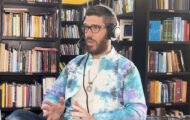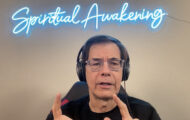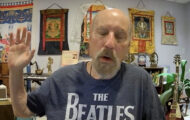IS IT ETHICAL TO EAT MEAT?
Hello!
A Joyous Thursday to you!
I can’t tell you how lovely it is to be home. I certainly had an amazing trip to Tulum, Mexico with my son, but it seems that no matter how beautiful a place may be, it never tops my own home surroundings.
Being a native Californian, I really love the natural beauty of California. Not too hot, not too cold, not to humid, not too many bugs (Bugs, Bugs, Bugs were eating me in Tulum!), great food and a lot of intelligent open-minded people.
This is my kind of place.
I had a restful day yesterday. I didn’t have a lot of fire in me after the trip home and I was quite sore from the lunging session I did the day before leaving Tulum.
I enjoyed some great tai-chi in my garden, some reading, got a massage from Christa at the massage center in Encinitas, and enjoyed Vidya’s great food.
In the evening when Penny got home, I gave her feet a good deep massage, which always makes her happy.
Now that I’m home, I’m able to sleep through the night.
The place we rented in Tulum had no AC and I was sweating all night, even with the fan blowing on me. I’ve never enjoyed sleeping in sweat while being eaten by little bugs with big appetites.
Penny told me we had some very strong wind and rain while I was gone and wasn’t sure, but she thought she’d heard rocks falling in my rock garden during heavy winds.
So as you can imagine, when I got home I had to see what was still standing. I was amazed to see that some of the sculptures I thought would have blown over didn’t.
One of the rock sculptures that’s proved the test to time and storms was made by Troy Casey at the last PPS zen In The Garden workshop.
He put this large stack up quite quickly and though I had no idea how long it would last, it turns out that Troy must carry the stone worker genes in him because his art still stands strong and beautiful.
Great job Troy!
Is It Ethical To Eat Meat?
A Contest by the NY Times: If you follow this link in your browser, it will take you to a page offering anyone to enter a contest being held by the NY Times.
The contest is based on a short essay of no more than 600 words on why it “is ethical” to eat meat.
I would like to encourage all of you, particularly CHEK HLC Practitioners to enter this contest. The contest ends April 8th, so don’t wait. After all, it’s only 600 words.
https://www.nytimes.com/2012/03/25/magazine/tell-us-why-its-ethical-to-eat-meat-a-contest.html
Today, I’m going to submit my entry to the contest, then go home and work with my rocks in the rock garden and do a piece of art.
They had a beautiful exposé of Huichal Indian string art in the San Diego airport when I came home and it inspired a vision in me that I want to draw, so I’m really looking forward to that.
I hope you enjoy the next Tao Te zen sutra in the series today:
Something’s Missing
Something’s missing in the tree; hollow are the branches.
Something’s missing in the sky; hollow is that whole.
Something rises in the well – yet, hollow is that hole.
Something pulls the ocean tides – yet only the moon can know.
Something’s missing in the sun – yet you see it glow.
Who is the guest knocking at the door?
Which book will you greet?
Zen gardener’s on hands and knees
Something’s missing
Is it the weeds?
Or rocks in beautiful rows.
zen practice honors empty space.
You cannot fill the full.
Something’s missing from the sheep
Is it your clothes of wool?
Let spirit fill your heart
Your lungs and your mind
Zen practice honors the empty as the full
Wholeness living as functional utility!
To apply your practice lesson effectively in your life, simply become aware of the benefits of “Something Missing.”
Is what’s missing necessary to produce functionality or utility?
Is the nature of something missing recognized for its very absence to facilitate life?
Meditate on whether your search for the apparent “something missing” is actually practical, or are you simply in a habit of over intellectualizing “the something.”
On a personal level, zen is a practice of recognizing that when we feel something’s missing within ourselves, we seek to be responsible and acquire it through our own efforts.
If we repeatedly expect others to fill our perceived emptiness, we become parasitic in relationships and risk losing our individuality.
To the degree that we lose our individuality, we at once detract from the collective whole.
Zen is the practice of honoring the missing and cultivating functionality, utility and wholeness.
In zen, “Something’s Missing” is a reminder that our very life is a process of both fulfillment and emptying. What’s missing is very often what we have.
That is zen.
Love and chi,
Paul Chek















Find me on the web